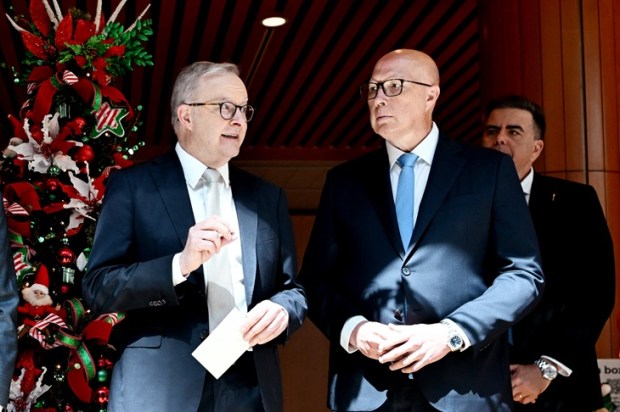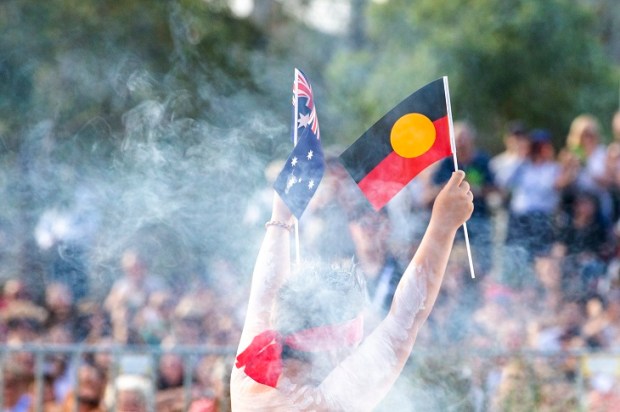One knows that an election is looming when the Prime Minister criss-crosses the country and promises to dole out money – which the government may not have – to encourage people to vote for the ruling party. On January 25, 2025, Anthony Albanese was in Western Australia where he sedulously followed the great tradition of promising the unpromotable, besides making positive comments about the State’s Cook Labor administration, which itself is facing an election in March.
But apart from this tradition, he reiterated a theme that may well become a leitmotif of Labor in the election campaign – that both parties should seek to unify the country, and that he has no time for the division sown by the Opposition. Specifically, he said that: ‘Whether you are someone whose ancestors have loved and cared for this land for 60,000 years, or whether you are making the pledge of commitment as a new citizen today, all of us belong to the greatest country on Earth, and all of us can take pride in a national story written by the courage of our people.’
Although this is a motherhood statement, meant to appease those who believe the myths about the caring Indigenous stewardship of this country, it is nevertheless a remarkably insincere comment, considering that Labor’s centre-left government has always promoted the politics of division and victimisation, thereby constantly attempting to turn blacks against whites, women against men, the poor against the rich, and so forth.
Curiously enough, at his National Press Club Address on May 18th, 2022, Albanese took a great deal of pleasure to remind the audience that his ‘non-Anglo-Celtic name’ is ‘a win for multicultural Australia’. This statement appears to indicate that he sincerely believes that ethnicity should play an important role in the choice of our leaders.
Of course, judging people on ethnic or racial grounds does not advance political equality, because people should be judged by the content of their character and not by their membership in any group. In this context, John Gray, a former professor of politics at Oxford, comments that no truly democratic society can be radically multicultural. Instead, a true democracy ‘depends for its successful renewal across the generations on an undergirding culture that is held in common’. This commonly shared culture, Professor Gray explains, ‘…needs not encompass a shared religion and it certainly need not to presuppose ethnic homogeneity, but it does demand widespread acceptance of certain norms and conventions of behaviour that, in our times, typically expresses a shared sense of nationality.’
Nevertheless, the current government aspires to replace our traditional values with alternative codes of morality that ‘are based not on familiar, accepted principles but on new and recondite ones, as if designed for another culture or tribe’. This results in the elimination of the value of the individual (and individual rights) and in the elevation of identity politics (and so-called group rights). According to US political commentator Tammy Bruce:
‘Framing arguments about race as arguments about culture has the additional advantage for the Left of removing the individual from the scene entirely. Ironically, it also reinforces what is supposedly being resisted: the isolation of people because of their race. By defining society not as an entity made up of individual people but as a collection of cultures – such as white culture, black culture, Indigenous culture – the Left effectively isolates us, whether we like it or not, into special-interest groups. The culture has the identity, eclipsing the individual. We’re no longer individuals with unique minds and talents; we’re defined instead by the colour of our skin, by the country in which we were born, by the religion we practice.’
Apart from a few elitists and their favoured minorities, the remainder of our people gain very little from the amorphous atmosphere of multiculturalism save bewilderment and the potential loss of a sense of national identity. As noted by the late British philosopher, Roger Scruton, ‘If people come from immigrant backgrounds that preserve the memory of a religious law, they will often revert to a religious experience of membership, and define themselves in opposition to the territorial jurisdiction by which they are ostensibly governed.’ Ironically, writes French philosopher Pascal Bruchner:
‘The ambiguity of multiculturalism proceeds from the fact that it imprisons men, women, and children in way of life and in traditions from which they often aspire to free themselves. The politics of identity in fact reaffirm difference at the very moment when we are trying to establish equality, and lead, in the name of anti-racism, back to the old commitments connected with race or ethnicity.’
In this context, the current government was recently responsible for the greatest racially divisive policy Australia has ever tried to implement. Of course, we are referring to the referendum of October 2023, when the Labor government sought to entrench an Indigenous advisory body, the Voice, in the Australian Constitution. If the referendum had been carried, the Voice would have divided the country forever into two tribes, Indigenous Australians, and the descendants of the so-called Invaders.
It is not our purpose here to rehash the arguments against the Voice and explain the reasons as to why this proposal failed spectacularly. But it is apt to dampen any euphorigenic celebrations and to alert readers to the continuing racial balkanisation of Australia. Although 60.1 per cent of the electorate voted ‘No’, the defeat of the Voice may still be characterised as a Pyrrhic victory because the unabated pressure for exclusive group rights to certain categories of people, particularly Indigenous Australians, continues relentlessly.
For example, the widely used Acknowledgment to Country ritual accelerates the pressure to recognise group rights in Australia. Almost every website of Australian corporate institutions, banks, universities, churches, businesses, councils, etc prominently displays an Acknowledgement to Country, proudly admitting that they are conducting business on Indigenous land, and honouring past, present (and sometimes even, emerging) leaders. Although there are numerous versions of the Acknowledgment – some more provoking than others – they all imply that the country belongs to the tribe that lived there before the British arrived in 1788. For example, the website of the Queensland University of Technology:
QUT acknowledges the Turrbal and Yugara as the First Nations owners of the lands where QUT now stands. We pay respect to their Elders, lores, customs and creation spirits. We recognise that these lands have always been places of teaching, research, and learning. QUT acknowledges the important role Aboriginal and Torres Strait Islander people continue to play within the QUT community.
Interestingly, there is a perception that most people are aware that these recurring acknowledgements are insincere and mechanical attempts at virtue-signalling. When one of the authors of this opinion piece recently indicated to a friend that this partisan and disingenuous behaviour promotes disunity, he was told that the Acknowledgment is not an atonement for perceived or documented acts of past discrimination, but is merely an innocent, and ultimately meaningless ‘practice’ that institutions are expected to embrace. In other words, the Acknowledgement is often seen as a convenient tool to earn a reputation as a good corporate citizen, regardless of the consequence of its use for the fabric of Australian society.
Of course, the Acknowledgment is only a plank in the tapestry of measures adopted to promote the lucrative Indigenous industry. Not only have we seen the emergence of race segregated spaces on university campuses, the Aboriginal industry has managed to convince governments to prohibit non-Indigenous Australians from visiting some national parks or climbing mountains, such as Uluru and Mt Warning. This has been achieved on the grounds that they are sacred sites. However, convincing proof of sacredness is not often offered, but the decision of denying access of non-Indigenous Australians to vast swathes of Australia is based on their racial characteristics, a trait over which people have no control.
Any assessment of these race-based practices, including the Acknowledgement to Country ritual, should consider their ramification for the Australian polity. Specifically, it may reveal that Australia, despite the defeat of the Voice, is still on track of becoming a State with two tribes. This is, of course, a gross violation of the principle of equality before the law. It is not possible to correct alleged past errors via a race-base system of discrimination that directly violates the equal treatment of citizens before the law. This view of the equality of citizens is an inheritance carved into the very foundations of western constitutionalism.
One of the great virtues of our Constitution is its equal treatment of all citizens. Far from being ‘racist’, this document is entirely colour-blind. It treats everyone equally, no matter when they or their ancestors arrived here. It is, therefore, entirely inappropriate to rely on this document to promote one group over the rest of the population. However, enshrining the Voice in the Constitution would have enhanced inequality and perpetuated divisiveness. At a philosophical level, the Voice proposal was inherently divisive and inequitable because it proposed a permanent race-based privilege that would have turned Australia into a constitutionally endorsed two-tier society.
Ultimately, constitutionally enshrining the Voice in the Constitution would have led Australia ‘down that dark corridor on the basis of race – thus prolonging the sorry history of racial difference’. This would be no more than a Machiavellian revisitation of the old ‘divide and conquer’ strategy so successfully applied by the Romans in ancient times.
Regardless of the tribalisation-enhancing policies of the government, our point is that the aggregated consequences of the Indigenous practices, including the Acknowledgement to Country, amounts to a non-constitutional endorsement of a divided country. Of course, Indigenous Australians are not a homogeneous group and, undoubtedly, many will be happy to see the Acknowledgment practice disappear. Like other Australians, they may want to be judged by the strength of their character, and the industriousness of their labour, not by the unverifiable and bombastic claims of previous ownership of Australia. As we have argued before in other publications, we need to implement a policy of equal citizenship. Such policy requires that burdens and benefits should not be distributed on account of a person’s race or any other biological characteristics but should result from genuine need of assistance and/or meritorious behaviour.
However, there are encouraging signs that policies of preferment will be revisited by a Dutton-led government. During a recent speech at the Menzies Research Centre, the Opposition Leader has flagged that cultural diversity staffers would be in the firing line of a Coalition government. Peter Dutton has appointed the formidable Jacinta Nampijinpa Price to a new role of government efficiency in a bid to reduce public service spending. The Department of Prime Minister and Cabinet spent more than $41,000 on 33 Welcome to Country ceremonies. ‘That kind of funding could be redirected to actually improve the lives of marginalised Indigenous Australians, as opposed to being used for what is effectively a welcoming ceremony, many of which have now become quite politicised,’ Price told ABC News.
This is a rather promising development. In any event, the coming election campaign should not give in to the politics of victimisation and divisiveness. Such promises merely continue the debate about the propriety of replacing individual rights with group rights. The ‘Voice’ debate has revealed just how far racial preferment in this country has progressed. The immediate task of Australia, in this post-Voice world, is to learn from the past and get on with the job of making a better future for those who now live in Australia and for those who follow, without excoriating those who believe in the implementation of the principle of political equality.
Gabriël A. Moens AM is an emeritus professor of law at the University of Queensland and served as pro vice-chancellor and dean at Murdoch University.
Augusto Zimmermann is a professor of law and served as associate dean at Murdoch University. He is also a former commissioner with the Law Reform Commission of Western Australia.
Zimmermann & Moens are the authors of The Unlucky Country (Locke Press, 2024).

























